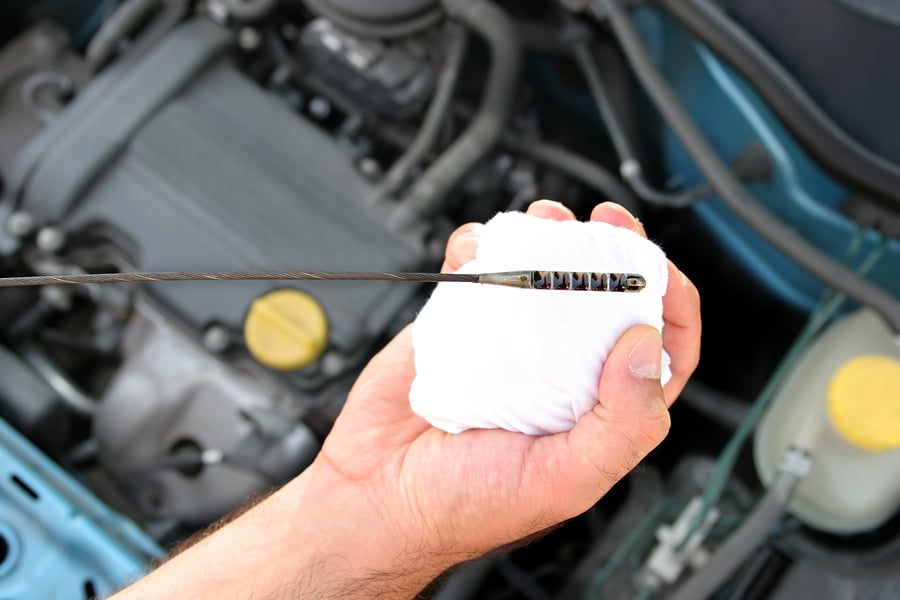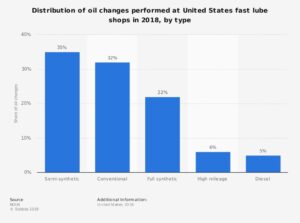
Oil changes are an important part of owning a car. Most car owners know it’s important to take your vehicle to an automotive repair service and get an oil change every 3,000-5,000 (semi-synthetic or three months) and 6,000-8,000 (full-synthetic or six months), depending on what’s recommended for your specific car. But, there are other factors that need to be taken into consideration. Oil quality, car age, and how the car is driven on a day-to-day basis are a few factors that can also affect how often your car may need an oil change.
Types of Motor Oil
You might not consider what type of motor oil is being put into your engine, but it’s actually an important factor, especially in figuring out how often you need to do it. The following is a list of common categories of motor oil.
- Full Synthetic: Made for high-tech engines, full synthetic oil has superior protection against deposits and viscosity – or how fluidly the oil moves. They flow easily at lower temperatures and maintain lubrication at high ones. A bit more expensive than others, only specific cars actually need them. The largest growth of any particular grade of oil is 0w20. This grade is ONLY available in full-synthetic. If required by the OEM, it will specify this weight on the oil cap. This was first made prevalent by import brands (Honda/Acura and Toyota/Lexus) and now has largely moved into domestic products/brands. The reason… variable valve timing (VVT). The camshaft(s) are moved by solenoids/valves charged by oil pressure. The VVT solenoids live high on the engine. So, they are usually the first thing to be effected by a low oil condition. This is most common on GM vehicles and Honda 3.5L engines. Honda calls their system VPS (Valve Pause System).
- Semi-synthetic: Made from conventional and synthetic oil, synthetic blend is made to provide protection for cars carrying heavier loads and operating at higher temperatures. Semi-synthetic oil is good for fuel economy as it evaporates less which reduces oil loss. This type of oil is good for SUVs and pickup trucks that need high-load protection. It is more affordable than full synthetic oil.
- Diesel: A good choice for diesel engines, diesel fuel has high viscosity and a lot of additives meant to clean and neutralize acids. Diesel engines have a greater need for these additives, as they create more soot and combustion residue. Generally, diesel fuel should not be used in engines that operate with gasoline.

According to the above graph, semi-synthetic oil is the most popular type used in the United States, followed closely by conventional. These are both affordable choices that will reduce wear-and-tear and keeping your engine running. It’s always important to check your owner’s manual for the recommended amount of time between oil changes for your individual car. However, we all know life happens. It’s impossible to be prepared for everything that could happen to your car. Most of us are pretty tough on our cars – that’s what they’re made for. Unforeseen circumstances need to be addressed quickly to protect the health and life of your vehicle. There are a few simple ways to determine whether your car might need an oil change outside of your regular mileage cycle.
Is the Check Engine Light or Oil Change Light On?
This one may seem obvious, but regardless of when you last had it changed, if the check engine light is on, your car needs to be checked out by a mechanic. Generally this happens when there’s a possibility of damage to the engine due to a problems part or lack of lubrication. It’s a good rule of thumb to have an auto repair specialist take a look at your car if there’s a light on that usually isn’t. If the red light is on constantly, tow your automobile to your mechanic.
Is There Excess Vehicle Exhaust?
Modern, healthy vehicles generally do not release exhaust from their tailpipes. We’ve all seen it – a ribbon of blue clouds following a car down the road. This is sometimes accompanied by a strange smell or unusual noises. A trail of smoke coming from your car can indicate serious issues. Often, this indicates old motor oil that isn’t functioning properly. Modern vehicles have lowered friction in the engine by utilizing ‘low tension’ piston rings. Excessive heat and carbon buildup can cause the rings to gunk up and allow oil blow by.
Have You Been Driving More Than Usual?
If you’ve recently taken a trip or have been driving a bit more than usual, the amount of time between your oil changes may significantly decrease. Any time you put more miles than usual on your car, make sure to take it in for a check, and expect to have to have the oil changed more frequently than usual.
Does Your Oil Look Dark or Dirty?
Clean oil is amber in color. When it becomes dirty from buildup of engine residue, it takes on a darker black color. It’s a good idea to check your oil yourself regularly – it’s recommended to do so once per week. All you have to do is remove your oil dipstick to check the color. If it’s dark brown or black, you need an oil change as soon as possible. Otherwise, you can always ask an automotive service technician to check it for you.
Is Your Car Making a Strange Ticking or Tapping Noise?
When oil is old, it tends to thicken, making it difficult for the engine’s parts to lubricate properly, or maintain viscosity. This can cause metal-on-metal or tapping noises. This can indicate the potential for damage, so it’s important to take your car to an auto repair service if you start hearing any unusual sounds.
Are You Having Trouble Starting Your Engine?
There are many possible causes for this. Often, issues with your car’s battery can contribute to this. Check the connections on top of your battery and clean them with a wire brush (Car Treatments). It’s important to change your battery every few years. It can, however, indicate the need for new oil if you’re consistently having trouble starting it up.
Is the Acceleration Slow or Sluggish?
Proper lubrication enables a car to accelerate smoothly. If your vehicle feels bumpy or slower than usual, this could mean you need an oil change.
Is it Shaking While Idling?
When a car’s oil needs to be changed, there’s a high level of friction present in the engine between the rings, bearings, and pistons. You may feel abnormal jolts and vibrations while idling when your car is overdue.
Can You Smell Burnt Oil or a Strange Odor Inside the Car?
If you’re noticing a strange burning smell while inside your car, it’s possible your engine is overheating due to low oil levels. Sometimes this smell is mixed with a gasoline or exhaust fume odor. This can often result from a leak causing the oil to drip on hot engine parts. An oil leak can cause serious damage or even start a fire – you don’t want to wait if you’re having this issue.
Is Your Fuel Economy Worse Than Usual?
If someone notices a significant drop in fuel economy, especially in conjunction with a check engine light, they should seek a proper evaluation of their vehicle by a trained professional. Modern-era vehicles use a combination of sensors and computers to monitor the running condition of the engine and adjust the amount of fuel delivered to each of the cylinders via the fuel injectors. Even a single malfunctioning sensor, such as an oxygen or mass airflow sensor, can provide false data/input to the vehicle’s computer and harm the fuel economy/mileage.
Have You Noticed Shifting Hesitation?
If you’re feeling a lag when shifting gears, you might need new transmission fluid or filters. It could also possibly mean your car needs new oil. It’s best to take your car in for a tune-up if you’re having this issue since there are lots of things that could cause this. In addition,If someone notices a significant drop in fuel economy, especially in conjunction with a check engine light, they should seek a proper evaluation of their vehicle by a trained professional. Modern-era vehicles use a combination of sensors and computers to monitor the running condition of the engine and adjust the amount of fuel delivered to each of the cylinders via the fuel injectors. Even a single malfunctioning sensor, such as an oxygen or mass airflow sensor, can provide false data/input to the vehicle’s computer and harm the fuel economy/mileage.
If someone notices a significant drop in fuel economy, especially in conjunction with a check engine light, they should seek a proper evaluation of their vehicle by a trained professional. Modern-era vehicles use a combination of sensors and computers to monitor the running condition of the engine and adjust the amount of fuel delivered to each of the cylinders via the fuel injectors. Even a single malfunctioning sensor, such as an oxygen or mass airflow sensor, can provide false data/input to the vehicle’s computer and harm the fuel economy/mileage.
Contact Us for Quality Towson Mechanical Services, Including Oil Changes
At Hollenshade’s, we take pride in providing comprehensive automotive services to the Towson community and beyond. Our experienced team is here to assist you with a wide range of mechanical services, and that includes efficient and professional oil changes. We understand the importance of regular oil maintenance for your vehicle’s longevity and performance. Whether you’re due for an oil change in Towson or the surrounding areas, need expert mechanical advice, or have any other automotive concerns, don’t hesitate to get in touch with us. Hollenshade’s is committed to delivering top-notch service, and our skilled technicians are ready to keep your vehicle running smoothly.
